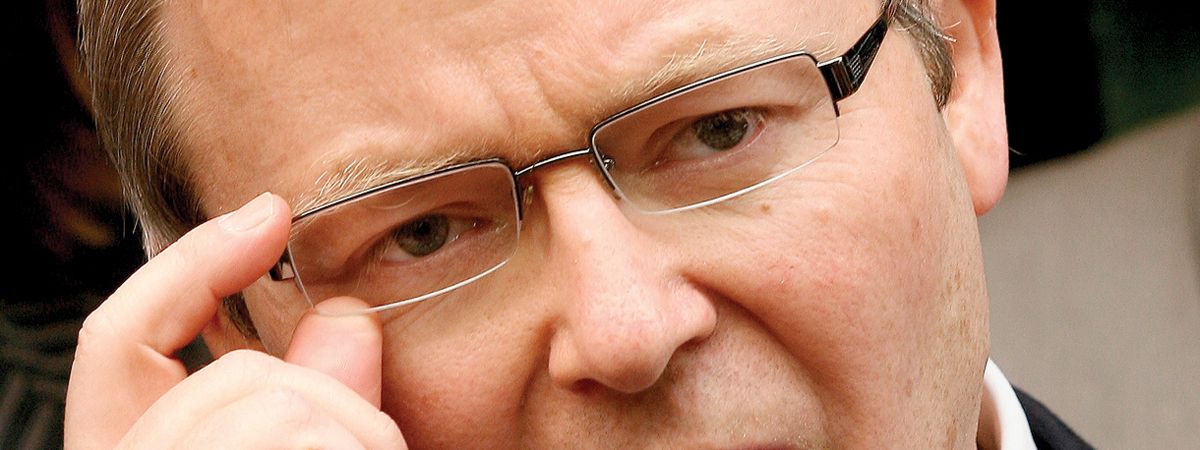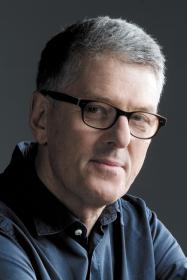“Those Chinese fuckers are trying to rat-fuck us,” declared Kevin Rudd.
As snow fell on Copenhagen – on its palaces and squats, on police and their dogs, on protesters rugged up against the fierce cold and on the big, bland Bella Center where the largest gathering of world leaders in history sulked and plotted – the prime minister of Australia faced the collapse of old dreams. This was the little boy fascinated by China, the kid who longed to be a diplomat, the man who believed a better world might be built through international agreement, and a prime minister struggling to meet “one of the greatest moral, economic and environmental challenges of our age.” Life had brought him, inevitably it seemed, to this icy Scandinavian city a few days before Christmas 2009 and he blamed the Chinese for wrecking it all.
The Copenhagen that mattered began on 17 December and lasted forty hours. Rudd slept for one of them. He wasn’t shy. He relished working with the big boys. Almost to the very end he was a player in the meetings that mattered. He began the last long haul working with Gordon Brown to try to persuade low-lying states like Kiribati and the Maldives to let the world warm a little more than 1.5 degrees. Mid-morning saw him deliver his set speech to the full plenary in the big hall. It was superior Rudd – pared down, not too much jargon, only a little mawkish about Gracie:
Before I left Australia, I was presented with a book of handwritten letters from a group of six-year-olds. One of the letters is from Gracie. Gracie is six. “Hi,” she wrote. “My name is Gracie. How old are you?” Gracie continues, “I am writing to you because I want you all to be strong in Copenhagen. Please listen to us as it is our future.” I fear that at this conference, we are on the verge of letting little Gracie down.
Australians with sharp ears might have picked the trademark boast that Rudd had done his homework: “If you examine, as I have done, the 102 square bracketed areas of disagreement that lie in the existing text before us …”
After Queen Margrethe’s state dinner at the Christiansborg Palace – Rudd so monopolised Princess Mary’s attentions that the British prime minister on her other side was left staring at his plate – he joined Nicolas Sarkozy, Angela Merkel, Brown and another twenty world leaders in freewheeling and futile efforts to find agreement. At 3 a.m. they left the haggling to their environment ministers. By this time delegates were sleeping on sofas all over the Bella Center. Rudd had an hour’s kip in an armchair, all he felt he needed to keep going.
Barack Obama jetted into the city that morning and joined the talks. The United States was offering little in the way of emissions cuts but wanted what the president called accountability. “Without any accountability, any agreement would be empty words on a page,” Obama told the delegates. Absent was Wen Jiabao. The snub was deliberate. Rudd believed the Chinese were intent on sabotaging any deal that involved binding obligations and international monitoring.
Tired and exasperated, surrounded by a knot of Australian officials and press, Rudd began to rage against the Chinese. He needed sleep. His anger was real, but his language seemed forced, deliberately foul. In this mood, he’d been talking about countries “rat-fucking” each other for days. Was a deal still possible, asked one of the Australians. “Depends whether those rat-fucking Chinese want to fuck us.”
Obama postponed his departure a few hours. At nightfall on an already endless day, the leaders of the twenty-six nations met again, with Wen Jiabao once more pointedly absent. The Guardian’s Mark Lynas reported the Chinese blocking every initiative:
“Why can’t we even mention our own targets?” demanded a furious Angela Merkel. Australia’s prime minister, Kevin Rudd, was annoyed enough to bang his microphone.
The bones of the Copenhagen Accord were decided that evening in a meeting between the US, China, India, Brazil and South Africa. Rudd was not there. The leaders agreed to vague targets, no monitoring and more gatherings down the track. This bare deal was sent on to Rudd’s group of leaders. Meanwhile Obama briefed the US press and flew out on Air Force One. When Rudd emerged an hour later, he had to be told the world already knew the outcome. Addressing reporters with barely the energy to take notes, he declared bravely: “We prevailed. Some will be disappointed by the amount of progress. The alternative was, frankly, catastrophic collapse of these negotiations.”
His efforts at Copenhagen are Rudd’s answer to those who accuse him of being a bureaucrat at heart, an incrementalist, a leader unable to dream. He sees Copenhagen as proof that he’s willing to go out on a limb, spend political capital and court trouble at home for a great cause. And Rudd insists Copenhagen was not a failure. He is one of an unusual species: the diplomat turned leader. Though his time in the foreign service was a brief seven years, they’ve marked him for life. For the diplomat, negotiations have never failed so long as there’s a prospect, however vague, of agreement somewhere down the track. For someone who thinks as he does, it can be just as important to keep everyone at the table, to keep talks going, to keep hopes alive, as it is to bring great issues to a head. The rhetoric of success Rudd used in these exhausted hours wasn’t all spin. It was authentic Rudd.
That he was still on his feet seemed a miracle. This least athletic of men has deep emotional and physical resilience. His climate-change minister, Penny Wong, was dead on her feet. Rudd seemed unaware of this. He was taken aside and urged to get her out of there, to get her to her hotel. Wong found a shower somewhere and stayed on for the last session. Later that morning Copenhagen came to a formal end, with the parties merely “noting” the vague deal brokered by Obama and Wen Jiabao.
Rudd’s bond with the people began to fray after Copenhagen. Having picked him as a leader long before he became his party’s choice, Australians had held Rudd in extraordinary affection for years. Never had the polls shown a prime minister so popular for so long. But after this debacle the mood shifted. Malcolm Turnbull had fallen. His place as leader of the Opposition was taken by a Tory head-kicker unembarrassed to embrace the denialists’ cause. The old consensus on climate change, which Rudd had identified himself with so closely, began to melt away. In April this year when he abandoned his emissions trading scheme until the far reaches of a second term, the people and the polls turned on him savagely. His leadership was in question. Rudd had sold himself to the Australian people as a new kind of leader: a man of intellect and values out to reshape the future. If he isn’t that, people are asking, what is he? And who is he? Rudd seems to have been with us forever yet still be a newcomer, indeed a stranger, in the Lodge. Millions of words have been written about him since he emerged from the Labor pack half-a-dozen years ago, but Rudd remains hidden in full view.
If Australia saw him through Canberra’s eyes, he would be done for. Though he has led until now a formidably disciplined first-term government – few leaks, only one minister lost – negotiated the global banking crisis of 2008 with exemplary skill, pulled off the great symbolic coup of the Apology and routed two Opposition leaders, the capital is tired of him. He’s seen in that little world of power as a weird guy and a failing prime minister. He puzzles his caucus, frustrates his ministers and irritates the press. The Australian has turned on him with a determination often as comic as it’s brutal. He is accused of running a chaotic office and bullying public servants. A habit of making endless speeches at big public events has earned the man – known at various times in his career as Dr Death, Pixie, Harry Potter and Heavy Kevvie – a new nickname: the Castro of the South Pacific.
When his approval rating began to dip sharply in the polls early this year, commentators wondered if he might be the first prime minister since Scullin back in the Depression to lose power after only a single term. There was speculation that he was in a very delicate position: essentially friendless in the party and ripe for decapitation by Julia Gillard even before the looming elections. This is rubbish. For one thing it underestimates the debts owed by the party to only the third man in sixty years to bring Labor from Opposition to government. But such talk does point to the strange patterns of the man’s political career.
He is not Labor’s leader because he reshaped the party around him as Gough Whitlam did. Nor was he a favourite son like Bob Hawke. Nor did he wrest the leadership after long internal warfare as Paul Keating did. Rudd leads no faction in the party and has won few friends in caucus. His rise to power was a peculiar triumph over his own party’s opposition – indeed, derision – achieved by appealing directly to the Australian people. Rudd’s dominance in the party is first and foremost about the polls.
Leaders aren’t there to be liked. Being an arsehole is no bar to high office. They always disappoint. The public understands this. And people know the climb to power can be bloody. Such things are forgiven if it all proves worthwhile. But of Rudd it has to be said that there is a large number of people who, having worked with him as a diplomat, public servant, shadow minister, leader of the Opposition or lately as prime minister, loathe the man. Between the verdicts of the public and those who come to know him face to face, there is a curiously wide gulf. It’s narrowing fast. Mark Latham once told him that he only held his position in the party “because of his media profile and public standing among people who have never actually met him.” That’s characteristically cruel, but it points to the fundamental question about Rudd that remains unanswered: who is he?
Colleagues from his time as the key back-room boy in Wayne Goss’s reforming government have an old joke they trot out whenever they meet to talk about those days of high hopes and disappointment. They don’t remember Rudd kindly. The joke: he is a creature from outer space. The proof? Who but an android would say so often, “I am only human.”
CONTINUE READING
This is an extract from David Marr's Quarterly Essay, Power Trip: The political journey of Kevin Rudd. To read the full essay, subscribe or buy the book.
ALSO FROM QUARTERLY ESSAY












